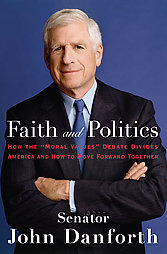 I always liked Sen. John Danforth. He was a humble man, an Episcopolian priest, a man of strong moral convictions. But unlike today’s Republicans–self-righteous defenders of God’s will as determined by the Elephant platform–Danforth was a true statesman. He prided himself on being a reconciler, a man who worked with Democrats to produce meaningful legislation, and who treated everyone with respect. His behavior emerged from deep-seated Christian character, not from the urgings of political consultants carrying the latest poll results.
I always liked Sen. John Danforth. He was a humble man, an Episcopolian priest, a man of strong moral convictions. But unlike today’s Republicans–self-righteous defenders of God’s will as determined by the Elephant platform–Danforth was a true statesman. He prided himself on being a reconciler, a man who worked with Democrats to produce meaningful legislation, and who treated everyone with respect. His behavior emerged from deep-seated Christian character, not from the urgings of political consultants carrying the latest poll results.
So when Danforth wrote a book called Faith and Politics, I quickly snapped it up. I suggest you do the same.
Danforth presents a strong indictment of “the takeover of the Republican Party by the Christian Right.” He is particularly contemptuous of “wedge” politics, the specialty of Karl Rove and the Bush Administration (and before them, Tom Delay and Newt Gingrich). Examples: abortion, gay marriage, and stem cell research. He devotes a chapter to various wedge issues, with conclusions that Dobson, Limbaugh, Gingrich, Delay, Bush, et al might not consider politically expedient for Republicans.
“In each case,” Danforth writes, “the issue energizes the base by pitting the ‘people of faith’ against their enemies. The Christian Right’s strategy of splitting apart the American people has worked.” It was worked to win elections by getting conservative Christians riled up against what they view as the godless enemy (rather than merely as fellow Americans holding opposing views). It has not worked to improve our country. Rather, it has produced a more deeply polarized nation than we’ve seen for many decades.
Although Danforth was an Episcopal priest, and actually carried out priestly duties in a low-key manner throughout his tenure in the Senate, Danforth insists, “Because the task of government is to hold together in one country a diverse public, my interjection of religion into politics would have been a profound disservice to my state and my country. It would have sown division where there should be unity.” His theology certainly shaped his views and his character, but he wouldn’t take it so far as to assume he was doing God’s will.
It’s a wonderful books, and tracks well with my own political leanings (and my total disaffection with the Christian Right). Some other comments:
- “Christians have a choice between reconciliation and divisiveness. Those who have chosen the latter course are getting all the attention.”
- We are seekers of the truth, but we do not embody the truth.”‘
- “At the least, Christians should make it clear that church leaders do not speak for them if they advocate exclusivity and divisiveness.”
- “Does any political agenda we create warrant our claim that it is the embodiment of God’s will? No, it does not.”
- “There is a difference between being a Christian in politics and having a Christian agenda for politics…. For the overwhelming majority of my time in public life, I had no certainty that my side was God’s side.”
As for me: the instant John McCain adopts wedge-issue divisive tactics, or brings Karl Rove aboard, he loses my vote. Thought it’s not certain he currently has my vote. It’s still a long way to November.
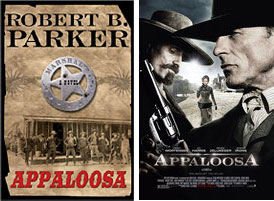 I saw a photo somewhere of Ed Harris in an upcoming Western movie called “Appaloosa.” I wondered, “Is that from the book by Robert Parker?” Parker, of the Spencer novels? The Appaloosa which had been setting on my bookshelf for over a year?
I saw a photo somewhere of Ed Harris in an upcoming Western movie called “Appaloosa.” I wondered, “Is that from the book by Robert Parker?” Parker, of the Spencer novels? The Appaloosa which had been setting on my bookshelf for over a year?

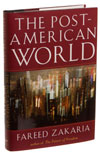 A book I can’t recommend highly enough is Fareed Zakaria’s The Post American World. I love big-picture books, ones which don’t focus just on what’s happening in the United States, but put the US in a global context.
A book I can’t recommend highly enough is Fareed Zakaria’s The Post American World. I love big-picture books, ones which don’t focus just on what’s happening in the United States, but put the US in a global context.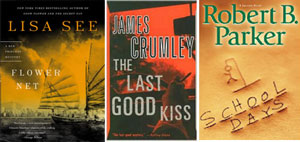 Here are three more novels I’ve read recently.
Here are three more novels I’ve read recently. I need to get caught up on some novels I’ve read during the past couple weeks. Here are three.
I need to get caught up on some novels I’ve read during the past couple weeks. Here are three. I always liked Sen. John Danforth. He was a humble man, an Episcopolian priest, a man of strong moral convictions. But unlike today’s Republicans–self-righteous defenders of God’s will as determined by the Elephant platform–Danforth was a true statesman. He prided himself on being a reconciler, a man who worked with Democrats to produce meaningful legislation, and who treated everyone with respect. His behavior emerged from deep-seated Christian character, not from the urgings of political consultants carrying the latest poll results.
I always liked Sen. John Danforth. He was a humble man, an Episcopolian priest, a man of strong moral convictions. But unlike today’s Republicans–self-righteous defenders of God’s will as determined by the Elephant platform–Danforth was a true statesman. He prided himself on being a reconciler, a man who worked with Democrats to produce meaningful legislation, and who treated everyone with respect. His behavior emerged from deep-seated Christian character, not from the urgings of political consultants carrying the latest poll results. 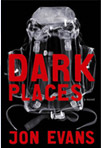 What a book! I’m talking about Jon Evans’ Dark Places, published under the Dark Alley imprint. The protagonist is an adventure traveler, a top-notch but distracted computer programmer whose first love is backpacking across remote areas of the world. In Nepal, he discovers a hiker who has been murdered in the same way his girlfriend was murdered in Cameroon. That sets in motion a hunt which takes us to Indonesia, West Africa, San Francisco, London, and the darkest recesses of the internet in an effort to track down this serial killer.
What a book! I’m talking about Jon Evans’ Dark Places, published under the Dark Alley imprint. The protagonist is an adventure traveler, a top-notch but distracted computer programmer whose first love is backpacking across remote areas of the world. In Nepal, he discovers a hiker who has been murdered in the same way his girlfriend was murdered in Cameroon. That sets in motion a hunt which takes us to Indonesia, West Africa, San Francisco, London, and the darkest recesses of the internet in an effort to track down this serial killer. 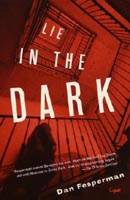 Finished Dan Fesperman’s Life in the Dark, a Black Lizard imprint about Vlado Petric, a police detective in Sarajevo during the Bosnia-Serb war of the 1990s. I previous read Small Boat of Great Sorrow, the second Vlado Petric novel. That was good. This one was better, mainly because of the surprise ending which I never anticipated, and which I would defy anyone else to guess.
Finished Dan Fesperman’s Life in the Dark, a Black Lizard imprint about Vlado Petric, a police detective in Sarajevo during the Bosnia-Serb war of the 1990s. I previous read Small Boat of Great Sorrow, the second Vlado Petric novel. That was good. This one was better, mainly because of the surprise ending which I never anticipated, and which I would defy anyone else to guess.  I’m only to page 28, but already I can say, “Wow! I love this book!”
I’m only to page 28, but already I can say, “Wow! I love this book!”


